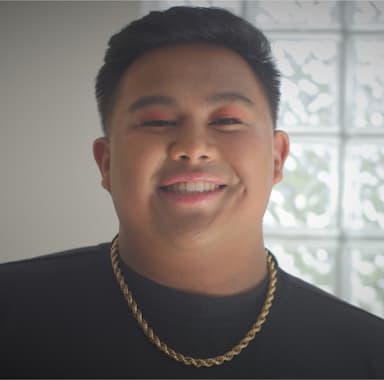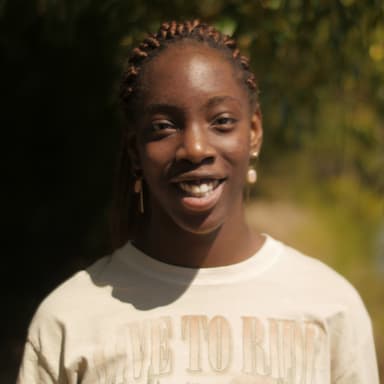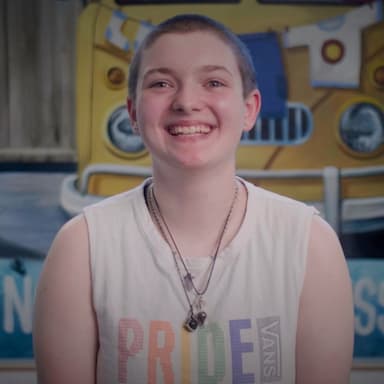Being able to understand and being able to have open, honest conversations, and just being there is just extremely important.
Having a conversation about mental health may sound like a simple thing, but it’s an important first step to breaking down stigma, connecting with others and making real change. While a conversation might start off awkward, creating the space to open up and be honest about your experience will help others understand and share as well. Keep in mind that there is an important difference between having a conversation with someone and acting as their counsellor or therapist. If someone is struggling with their mental health—and especially if they are suicidal—it is important to help them get connected with trained help, or an adult who will be able to make sure they are safe as they get the help they need.
Being there to support one another by having a conversation, whether it's a talk to get to know each other, or something more in depth about how we’re really doing, can help inspire change. In any conversation where you are trying to express concern and care for someone, you can exercise active listening. It’s important to remember to ask questions and try to avoid making assumptions about what is going on for the person or what they might need. While you do not need to be an expert to have a conversation with someone about how they are doing, it can be helpful to read up on the topic (such as substance use, anxiety or depression) before or after the conversation to increase your own understanding.
Having conversations may be difficult at times; it’s important to remember to take care of yourself. As Jay mentions in the video, an important first step for them was to learn to love themselves and to get to know themselves better by reflecting on what makes them happy. By getting to know yourself better, you can enter a conversation more fully and be able to participate. Don’t forget to pay attention to how you’re doing and to check in with your own supportive relationships regularly. Staying connected with others who are important to us and who care for us (including mental health professionals like your school counsellor or a community resource person) is one of the best ways we can help ourselves as we also seek to help others.
When you go into a conversation with someone, never go in to change their opinion, only to share your education. If you go in to share knowledge, they will feel accepted and that will open so many doors.
Actionable Insights
Conversations about mental health may be a bit awkward or difficult but they are still important. We can all have a conversation about mental health, but it's important to remember that some topics or situations also require the support of a professional; a conversation can be an important first step in getting someone connected with trained help.
Some of the best conversations are had by being honest and open. By opening yourself up to people around you, we give them the opportunity to be open too.
Paying attention to mutual hobbies or interests allows for an opportunity for shared connections with others. You can build on that to take the next step to further deeper conversations.
Tools & Resources
- Tips for Talking with Someone or How to be an active listener, through Foundrybc.ca [website]
- Say What You See - How to break the ice and start the conversation, through Be There [website]
- Check out mental health and wellness topics on foundrybc.ca or mentalhealthliteracy.org [website]

Jay (he/she/they)
SurreyJay (he/she/they) is a 23 y/o Non-Binary, Gay, Queer, Filipino-Canadian born and raised on the ancestral and traditional territories of the sq̓əc̓iy̓aɁɬ təməxʷ (Katzie), Qw'?ntl'en (Kwantlen), and SEMYOME (Semiahmoo) First Nations, also known as Surrey, BC, Canada. Jay is passionate about music, dance, singing, and most of all, mental health advocacy. Through social media and the spaces Jay takes up, they strive to advocate for individuals identifying as Queer, Plus Size, or as BIPOC. Jay hopes to see more youth inspiring others to share their story and believe in their truth.

Mboule (she/her)
Prince GeorgeMboule (she/her) is a Grade 12 high school student and is from the traditional territory of the Lheidli T'enneh (clayt-clay den-ay) First Nation and their traditional land, also known as Prince George, BC. She started her advocacy journey when she decided to take a leap of faith and join the Balancing Our Minds Toolkit youth advisory committee in hopes that she could expand her knowledge on how to become a better advocate and also inspire others to start their own advocacy journeys. Mboule is already moving forward with her own journey, and has decided to volunteer as a TeleFriend with Integrative Touch, a non-profit organization based in Arizona.

Noia (he/they)
SurreyNoia (he/they) is a Grade 11 student that resides on the ancestral and traditional territories of the sq̓əc̓iy̓aɁɬ təməxʷ (Katzie), Qw'?ntl'en (Kwantlen), and SEMYOME (Semiahmoo) First Nations, also known as Surrey, BC, Canada. They started advocating for mental health at a young age by creating and leading a youth empowerment program in Grade 5. Noia also volunteered with his school's Inclusion program, working to bridge the gap between students with hearing impairments and hearing students. During the past few years, Noia has become a diversity team leader and a leader within the GSA (gender, sexuality alliance) community. Community advocacy continues to remain important as Noia works with non-profit Indigenous organizations to help with youth empowerment and cultural reclamation.